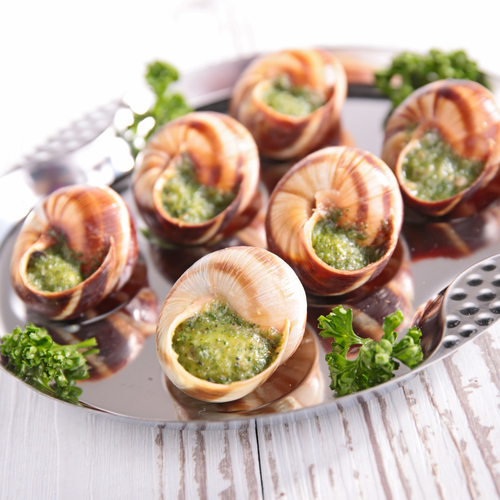Is Escargot Bad For You?
Also Known As: cooked land snail
Short answer
Escargot is a great source of several vitamins, minerals, and health-promoting chemicals, all of which are extremely beneficial. For optimum nutrition, we recommend substituting the traditional garlic-butter sauce with an olive oil based sauce.
Recommended Alternative
Very healthy and numerous health benefits. Harmful qualities may be associated, but aren't usually serious.
View Full Grading System
Category 'A'
Very healthy and numerous health benefits. Side effects are rare. Things rated an 'A+' are typically necessary for survival (for example, water).
Very healthy and numerous health benefits. A few harmful qualities may be associated, but only under certain circumstances such as an allergic reaction.
Very healthy and numerous health benefits. Harmful qualities may be associated, but aren't usually serious.
It is important to note that even the best things in life can become bad in immoderate amounts. So, although something may be rated an 'A+', overconsumption/overdoing can bring unwanted effects.
Category 'B'
Very beneficial to your health. Things rated a 'B+' may have a few harmful qualities to pay attention to.
Overall beneficial to your health. Things rated a 'B' may have some harmful qualities to pay attention to.
More beneficial to your health than not. However, harmful qualities are most likely associated and shouldn't be overlooked.
The main difference between category 'A' and category 'B' is the harmful qualities typically present in 'B' items. Serious side effects are usually uncommon, but are still possible and should be taken note of.
Category 'C'
Both beneficial and harmful qualities associated. Things rated a 'C+' are typically a bit more on the beneficial side. Still, moderation is important.
A fairly even ratio of beneficial and harmful qualities. Moderation is important. Very general topics that can lean towards both sides of the spectrum will be placed here as well. Rice, for example, can be good or bad depending on the type.
More harmful than beneficial. Side effects are common, especially when consumed/done excessively. Moderation is very important.
Category 'C' usually denotes to both good and bad qualities. When it comes to this category, it is important to keep this word in mind: moderation.
Category 'D'
Harmful to your health. Although benefits may be associated, the bad most likely outweighs the good. Moderation is very important.
Harmful to your health. A few benefits may be associated, but the bad outweighs the good. Moderation is extremely important.
Harmful to your health. Very few, if any, benefits are present. Things in this category should be avoided as much as possible.
Category 'D' is typically for things that are more harmful than beneficial. While consuming/doing something unhealthy once in a blue moon shouldn't hurt, we definitely recommend eliminating 'D' items as a regular part of your routine/diet.
Category 'F'
Category 'F' is for things that fail to bring anything beneficial to the table, and are very harmful to your health. We recommend completely avoiding anything in this category. Long-term side effects of 'F' items are usually very serious.
Category 'N'
'N' stands for neutral. Things placed into this category are generally (a) neither good nor bad for you, or (b) lack the necessary evidence to reach any conclusions.
Long answer
Escargot is the French word used for the less-appetizing sounding "land snail" or Helix pomatia. If you aren't yet a fan of escargot, you may want to give it a try. Not only is it easy to prepare, but it is an overall health booster in a shell. For starters, escargot, which per 100-gram serving contains just 90 calories and two grams of carbohydrates, is an excellent way to lose weight. Preventing obesity also leads to a decreased risk of diabetes, stroke, high blood pressure, and heart disease. Snails also contain a healthy amount of nutrients that help reduce the risk of the aforementioned diseases and more. Selenium and vitamin B-12, both found in plentiful amounts in escargot, help protect and strengthen the immune system. Magnesium, of which 212 mg are found in three ounces of escargot, is linked to lower blood pressure, and a decreased risk of heart disease and cardiovascular afflictions. Vitamin E is good for not just the skin, but the eyes as well, possibly helping to improve the vision of people with uvea inflammation.
Escargot may also help put you in a good mood as it contains the serotonin-stimulating chemical tryptophan. Yet another benefit of escargot is that it contains a low amount of sodium and a healthy amount of potassium. Not only can high amounts of sodium lead to an increased risk of stroke, heart disease, and kidney failure, but potassium also helps to mitigate the negative effects of sodium on the body.
There is 50 mg of cholesterol per 100 g serving, so this may be an issue for those on a low-cholesterol diet. Additionally, eating escargot will not provide you with any fiber, but it will give you a good amount of protein, with about 14 grams being found in just three ounces. Another point to consider is that escargot is often eaten with garlic butter, which adds a decent amount of saturated fat. However, even this can be nullified by substituting extra virgin olive oil.
Possible long-term side effects
Ingredients to be aware of
Benefits
- promotes:
-
eye health
-
skin health
-
improved mood
-
weight loss
-
decreased risk of stroke
-
decreased risk of heart disease
-
decreased risk of diabetes
-
decreased blood pressure
Our Wellness Pick
(what is this?)
Smoked Oysters in Olive Oil
- Natural smoke flavor
- Rich in nutrients
- Pure olive oil base
- Convenient 3oz cans
- Bulk pack of 18
Learn More!
Please turn your Ad Blocker off to see this content. Thank you!
Thank you for your feedback!
Written by Jeff Volling
Published on: 12-29-2015
Last updated: 12-15-2023
Thank you for your feedback!
Written by Jeff Volling
Published on: 12-29-2015
Last updated: 12-15-2023

 Approved by
Approved by 













